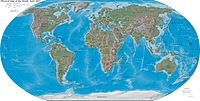
Portal:Geography
edit
The Geography Portal
Geography is the science that studies the lands, the features, the inhabitants, and the phenomena of the Earth. A literal translation would be "to describe or write about the Earth". The first person to use the word "geography" was Eratosthenes (276–194 BC). Four historical traditions in geographical research are the spatial analysis of the natural and the human phenomena (geography as the study of distribution), the area studies (places and regions), the study of the man-land relationship, and the research in the earth sciences. Nonetheless, the modern geography is an all-encompassing discipline that foremost seeks to understand the Earth and all of its human and natural complexities—not merely where objects are, but how they have changed and come to be. Geography has been called "the world discipline" and "the bridge between the human and the physical science". Geography is divided into two main branches: the human geography and the physical geography.
| More about Geography... |
edit
Selected article
Portal:Geography/Featured article/March, 2013
edit
Selected picture
Portal:Geography/Featured picture/2013, week 10
edit
Did you know...
- ... that Viedma Glacier (pictured) is part of the huge Southern Patagonian Ice Field, the third largest expanse of continental ice after Greenland and Antarctica?
- ... that Ridge A in Antarctica has been identified as the coldest, driest, calmest place on Earth?
- ... that Mount Widerøe, Antarctica, is named for Viggo Widerøe, who flew aerial photography planes to map 80,000 km2 (31,000 sq mi) of the continent's coast?
- ... that Lake Bistineau in northwestern Louisiana was originally formed in 1800 by flooding stemming from a large log jam on the nearby Red River?
- ... that Hurricane Greta in 1956 was the largest Atlantic hurricane ever recorded?


